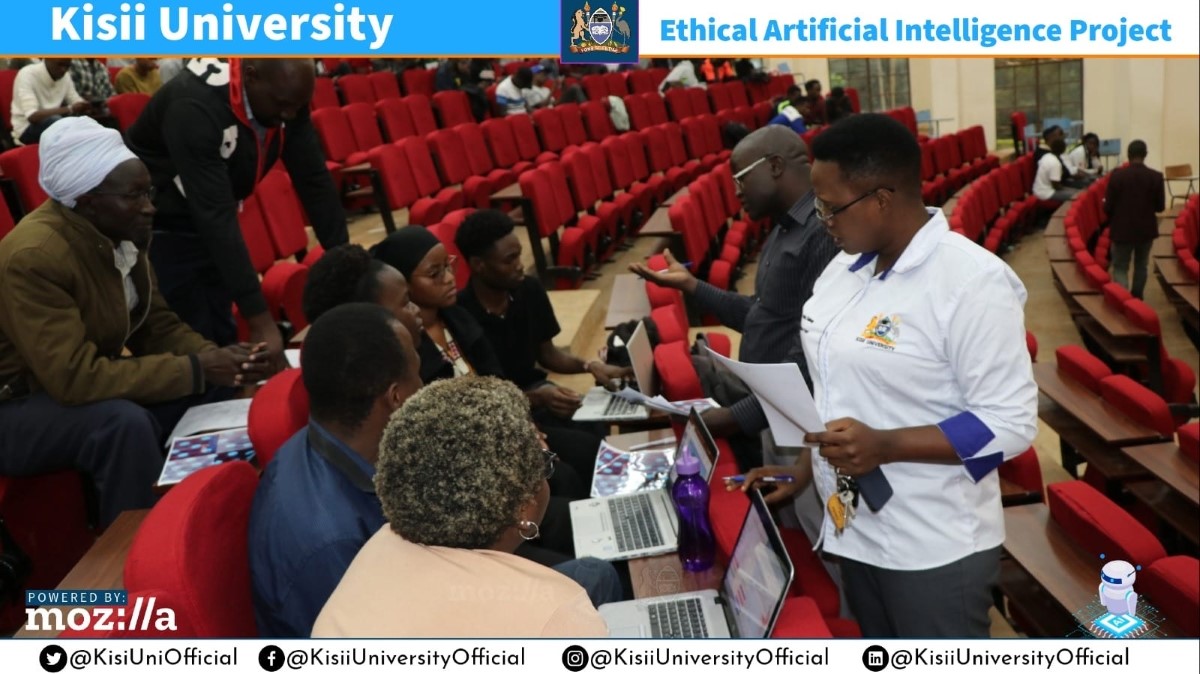Using Intelligence Ethically; My Reflective thoughts on AI

Steve Ouya Patrobers is my name and am currently a dedicated Fourth-year student pursuing a Bachelor's degree in Information Technology at Kisii University. I have a keen interest in Ethical Artificial Intelligence. My academic journey has been driven by a passion for utilizing technology to address real-world challenges, particularly within the domains of artificial intelligence (AI) and machine learning (ML).
During my early university years, I focused on developing my skills in AI and ML techniques. I discovered my passion for these subjects during a hackathon where I collaborated on a project that aimed to use machine learning to predict agricultural livestock disease. The project underscored my commitment to ethical AI solutions. Beyond academic pursuits, my goal is to become a proficient IT professional specializing in artificial intelligence, contributing to cutting-edge projects and driving positive societal change.
I took a Responsive Ethical Artificial Intelligence course led by Prof. Mzee Awuor and it was transformative, focusing on developing Ethical AI projects while exploring AI language frameworks. We got a chance to address the critical issue of bias in AI systems and designed intelligent agents with ethical reasoning. One of the course's highlights was its focus on eliminating bias in AI systems by designing intelligent agents with ethical reasoning. We were guided through exploring various types of bias, including algorithmic, data, and societal bias, challenging us to consider the implications of biased AI systems. Through workshops, lectures, case studies, and hands-on projects, in class assignments, we learned practical techniques for detecting, mitigating, and preventing bias in AI models.
The course taught me about the ethical responsibilities in AI development, including detecting and mitigating bias at every stage of the AI development lifecycle. The professors created an inclusive learning environment where diverse perspectives were valued, empowering us to challenge assumptions and biases through open dialogue and critical reflection. I am grateful for the guidance and mentorship provided by the Computing Department's staff, which has left a lasting impact on my academic and professional journey. Beyond bias, the course also broadened my understanding of ethics in AI more broadly. I explored ethical frameworks and guidelines, such as the principles of beneficence, non-maleficence, autonomy, and justice, and their application to AI design and implementation. Through case studies and discussions, I grappled with ethical dilemmas and learned to evaluate the societal impacts of AI technologies critically. Responsive Ethical AI course has significantly improved my knowledge of AI ethics. I now feel confident in identifying potential ethical pitfalls in AI projects and actively applying strategies to mitigate them. This newfound awareness empowers me to contribute to the development of responsible and impactful AI solutions.
Our team developed an IoT-based smart waste management and monitoring system for our university. The system uses ultrasonic sensors, a GPRS/GSM module, a camera, weight sensors, and receiver and transmitter modules for wireless communication. AI plays a pivotal role in optimizing waste management by analyzing real-time data to predict waste accumulation patterns, optimize collection routes, and schedule pickups more efficiently. Ethical considerations were paramount, with rigorous data privacy and security measures implemented, and measures taken to mitigate algorithmic bias. The project was conducted with full transparency and collaboration with university stakeholders, creating a smart waste management solution that aligns with the values and needs of our university community.
Our team initiated an IoT-based smart waste management and monitoring system project aimed at revolutionizing waste management on our university campus and scaling it up to meet global standards. The objective was to address inefficiencies in traditional waste management methods while integrating ethical considerations into the project. The problem we aimed to solve was the lack of real-time monitoring and optimization in waste collection processes, resulting in overflowing bins, inefficient resource allocation, and environmental hazards. To tackle this, we employed various components, including ultrasonic sensors for accurate bin fill level measurements, a GPRS/GSM module for real-time communication and data transmission, a camera for image recognition to detect irregularities like illegal dumping, weight sensors to measure waste collected, and receiver and transmitter modules for wireless communication. An AI-powered system was used to enhance waste management operations by analyzing real-time sensor data and predicting waste accumulation patterns. By optimizing collection routes and scheduling pickups efficiently, the system helped prevent bin overflow, reduce fuel consumption, and minimize environmental pollution. To ensure ethical considerations, measures were taken to safeguard sensitive information collected by the system and mitigate algorithmic bias.
Ethical principles were integrated into the project design and implementation to create a smart waste management solution that aligned with the values and needs of the university community and society at large. Transparency and accountability mechanisms were established to provide stakeholders with insights into the system's decision-making process, promoting trust and transparency. The project was conducted collaboratively with university stakeholders, including faculty, students, and administration, with regular feedback loops established to address concerns or ethical implications raised during development and deployment.
I believe several areas could be further emphasized or added in future iterations. Firstly, a deeper exploration of the societal implications of AI technologies, including topics such as privacy, transparency, and accountability, would provide a more comprehensive understanding of ethical AI development. Furthermore, incorporating case studies and real-world examples of ethical dilemmas in AI projects would offer practical insights into navigating complex ethical challenges.
I am confident that my background in Information Technology and my strong interest in ethical AI align well with the objectives of this course. By combining technical proficiency with an ethical mindset, I am capable of analyzing the ethical implications of AI technologies. Additionally, I can collaborate effectively with peers on ethical dilemmas. This course has provided me with the knowledge and skills necessary to develop AI technologies responsibly. I am eager to apply this learning to my future projects and promote the ethical development and deployment of AI systems.
In summary, the Responsive Ethical AI course has been instrumental in shaping my understanding of ethical AI development and fostering my passion for responsible innovation. I am grateful for the invaluable insights gained from this course, and I am inspired to continue exploring the intersection of technology and ethics, contributing meaningfully to the advancement of AI technologies.
Going forward, I am eager to apply these learnings to my future projects and initiatives, with a commitment to upholding ethical principles and addressing societal challenges. With the support of the esteemed Mozilla Foundation and Kisii University, I believe we can collectively work towards a future where AI technologies are developed and deployed responsibly for the benefit of society. The support, providing scholarships and resources for students like myself will greatly contribute to our collective efforts in advancing the field of AI and fostering a culture of ethical innovation.
By: Steve Ouya Patrobers
Ouyasteve98@gmail.com

 Kisii University Support
Kisii University Support